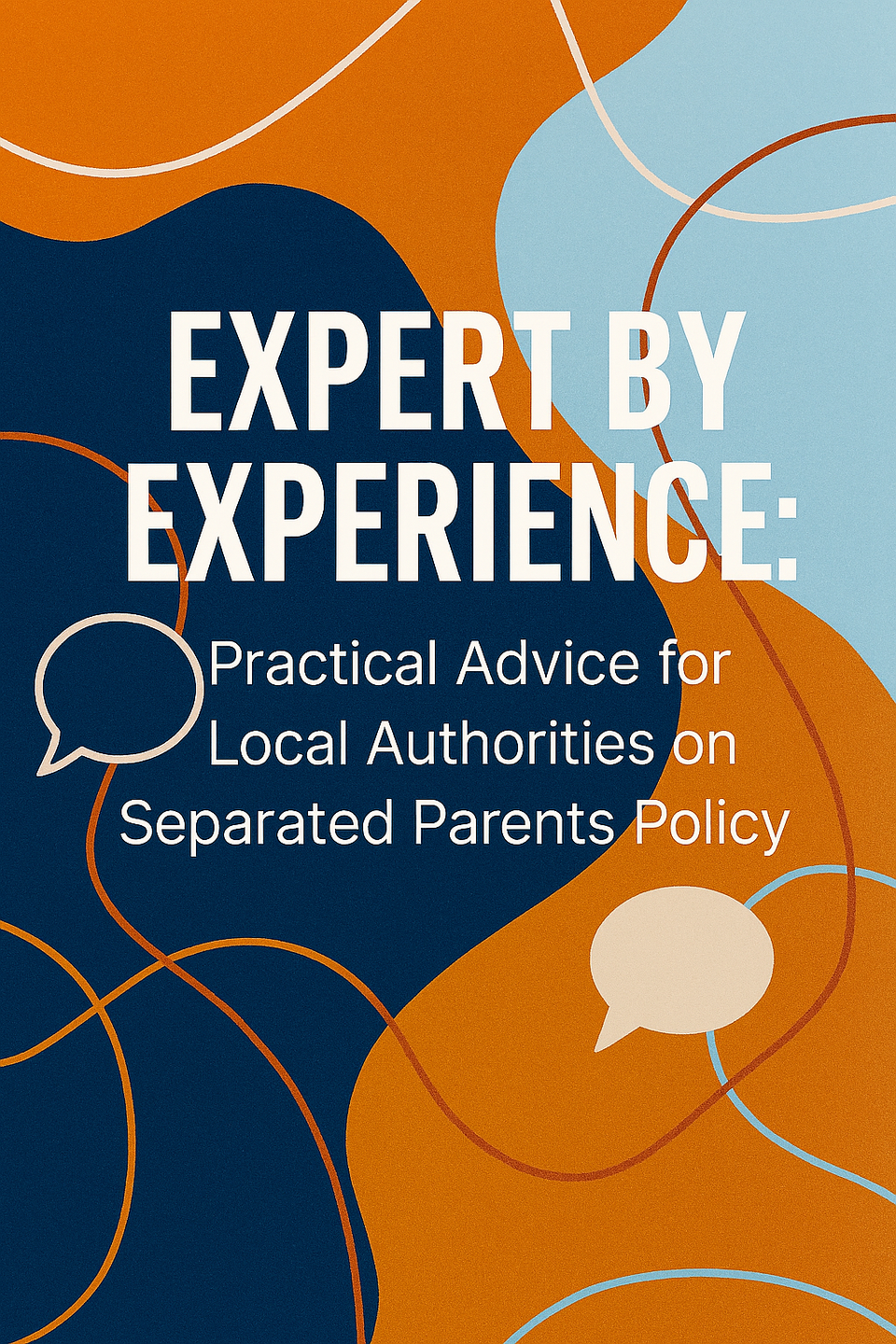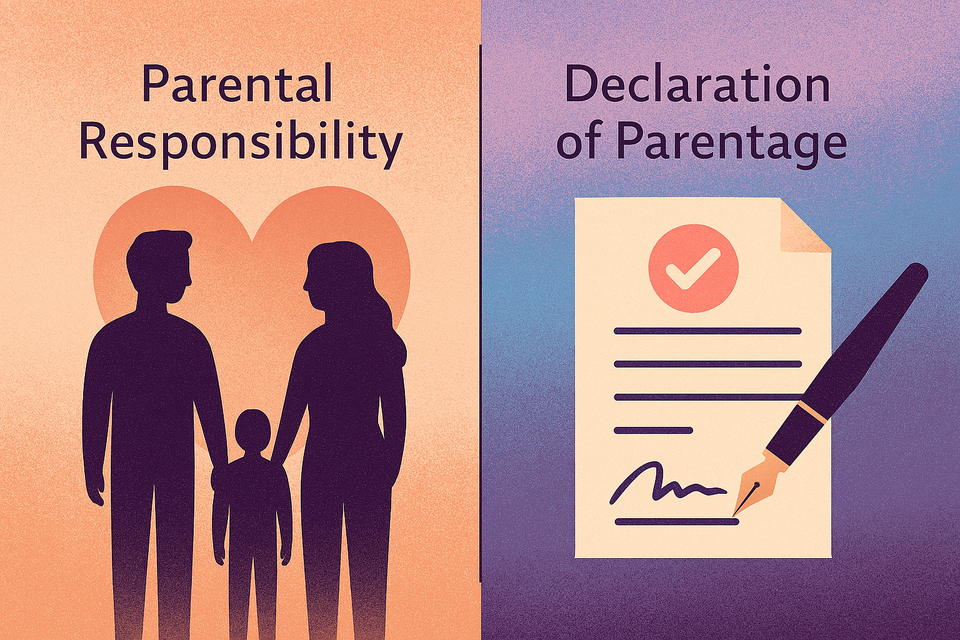The Art of (Self) Advocacy II.
The second in my series of posts about self-advocacy in the family courts.

In the first post of this series, I covered how a self-litigant should expect to research the law, advance their arguments and conduct themselves at court in order to maximise their chances of winning. If you have not yet read that post, I suggest doing so now. In this post, I will further points made in part one and walk through the welfare principle which guides judges during family court proceedings; but first, I want to take a moment to revisit the LASPO problem.
The LASPO Problem
I started this series just over 3 years ago. At the time, I said "The result of LASPO is that parents, low-income, working and silver spooned must now represent themselves, unless they can pay for a solicitor or meet extremely stringent criteria". That was and still is very true. If a low-income father was having contact issues, he would no longer qualify for legal aid and would need to pay privately for a solicitor and if required, a barrister too. That could mean dropping below the poverty line in order to maintain contact with his child(ren). Likewise, a silver-spooned mother would not qualify for legal aid to maintain contact with her children, even if she was technically penniless whilst going through, or having gone through divorce, because on paper she was wealthy. The natural result is a chaotic system of self-litigants in civil courts.
The main exception to the above is domestic abuse/violence, however that entire area warrants a blog post on its own because it creates an entire separate category of problems - so I will not cover it here except to say that when LASPO was introduced, there was a rather notable spike in applications for non-molestation orders (restraining orders, to use the americanism). Those may have been legitimate claims, but I suspect there were an awful lot of people in the same situation as this unfortunate bloke alternate sauce alternate sauce as well.
Since I first wrote about LASPO, very little has changed in terms of the problems I outlined. If anything, the problems have only worsened which is a sorry set of affairs given the English legal system is world reknown as one of, if not the best. If you will indulge me, I suggest this is because English history is awash with struggles for fairness and common good. The most well known is the signing of Magna Carta which saw King John and later King Henry sign the treaties which gave greater assurance of justice - although there is some dispute as to whether this was for all subjects, or just aristocracy. The most popular clause "No free man shall be seized or imprisoned, or stripped of his rights or possessions, or outlawed or exiled, or deprived of his standing in any other way, nor will we proceed with force against him, or send others to do so, except by the lawful judgement of his equals or by the law of the land. To no one will we sell, to no one deny or delay right or justice" remains as a key principle of the law to date.
Another example stems from Law and Government in England during the Long Eighteenth Century by David Lemmings. David suggests that English parishes were once held collectively accountable for the actions of every member of the community. If a parish failed to maintain a road which they were beholden to maintain, it would fall to the entire community to make amends unless they could successfully defend the claim laid against them. This being a somewhat technologically lacking period, these people did not have access to google and they would not have had easy access to learned legal advocates as we do today. That being the case, lay people (meaning non-legal people) had to advocate for themselves. The result was citizenry who became adept at understanding the law and arguing their cases. For lay people to be able to understand, contribute and advocate within the legal processes of the time - sometimes bringing about change - meant the whole of society was involved in debates around the law and I further suggest contributed towards laws being made practical and fair for all.
I don't claim the English Legal System is infallible, or that it doesn't have improvements to make; but it is certainly better than some systems around the world. If you want a flavour, how about being whipped and jailed for sleeping with someone you love? This is a freedom we take for granted in the West. It is not punishable at all as long as everyone consents. Others might disapprove, maybe even express their dissatisfaction but it is not a matter that for the law. I don't believe any corporal punishment exists in the English legal system either, unless you count police batons which are rarely used - and certainly not deployed because people love each other.
Justice in Africa can end in mob burnings and beheadings depending on who has been wronged and their beliefs. Mexico also suffers these problems, albeit ruled by drug cartels who find pleasure by finding brutal methods to torture people into compliance. A piece of legislation working its way through Parliament at the moment would restrict Brits from seeing the videos and pictures the cartels post, classifying it as extremist/terrorist content; but I think it's important for people to see the reality of such crimes - not because the content is "good" or "fun", because it's not; but because being aware of the serious dangers other people pose is healthy and educational for everyone's development especially in a society which seems to be moving in the direction of believing hurt feelings and diverse debate is more dangerous than having limbs hacked off with a rusty machette.
Those are not just my idle musings of course. I speak to people from African states, the Middle East, India and former Soviet States in my local area. Usually, After some discussion about their home countries, there will be an admittance that there is an awful lot of corruption "back home" which can involve killings, mutilations and torture. In some of these discussions, the people I've spoken to have suggested it might be better if their country was a British Colony again because of the law and social movement the British brought to their countries - an opinion which I feel would be extremely unpopular if they had expressed it in an academic space and even more unpopular with Brits who seem to self-loath their country. Reader, you may scoff, perhaps more so given the current political climate in the United Kingdom, but we are extremely lucky to live in a country where "The Rule of Law" is supreme and not "The Rule of Sword" as many of the people I've spoken to fear from their home countries. These people see the Union Jack as a symbol of justice - as a symbol of hope, freedom and safety. I should add, all of these people still had extreme pride in their home nation; but still felt British.
Given such historical context and globally reknown reputation, why are we facing chronic underfunding of the legal system? Since 2013, legal aid for civil cases has been all but wiped out leaving the most vulnerable in our society without the ability to instruct a solicitor to advance their rights. Some people may not see this as an issue as the government have tried to push an agenda that it is "fat cat" legal aid solicitors - an agenda that has been consistent since the 1990s, persisting into the 00's - who are milking the public purse dry. Having read a number of blogs, books and several interviews; I believe the fat cats are taking home between £15 - £50 for each legal aid case.
Each case involves hours of preparation, travel to court, liasing with clients, other professionals and then advancing the clients case. That's quite a lot of thankless work for such little money.
One might have thought given the backlash from the implementation of LASPO in the civil court system, including getting a public rebuke from Lady Hale in 2019, who claimed that "it's unreasonable to expect a husband and wife or mother and father who are in crisis in their personal relationship to make their own arrangements without help" notwithstanding batterings from the Law Society and the Human Rights Commission, that the government may have taken a step back and reviewed the damage. But oh no. Instead, the government have in fact taken aim at Criminal Legal Aid too.
Legal advocates took the most radical action they could take in striking recently. Those striking were not 'fat cats' or highly paid; but criminal legal aid representatives.
Now, don't get me wrong. I'm all in favour of people doing things for themselves; but as I outlined previously, people who go to court, especially family court, are likely to be emotionally, psychologically and logically drained. They will want their justice, not what is understood to be correct under the law. This leaves the judge in an awkward position because instead of weighing up professional arguments posed by advocates with training, they must act as a mediator between very hurt and potentially damaged parties. This situation is amplified if representatives are not available in the criminal courts, or at police stations.
This really is a problem that everyone should have on their minds. Our legal system is under threat. A system that has been a world class, constantly developing beacon of fairness since the 1200s. I'm sure some will huff and puff and scream about certain parts of history and take issue with x, y or z. Those issues are beside the point - we have consistently rooted out unfairness as a society and the unfairness here is that the poorest in society cannot access justice.
[1] - Ian HowGate featured in the BBC article did not have contact issues, however when I researched for my BSc (Hons) Computer Science dissertation, there was data available from the Law Society backed up by Loughborough University which suggested that families would drop below the poverty line by £864 (max) where those families are not eligible for legal aid.
The Welfare Principle
Transitioning to the main focus of The Art of (self) Advocacy pt2. If you are in a position where you need to rely on self-litigation, your own research or the very basic offering from citizens advice or heaven help us, those who claim to be expert mckenzie friends. Your first port of call should be the welfare principle.
The "Welfare Principle" considers the welfare and rights of the children involved - if there are children involved -family courts deal with a lot of different issues, but we shall assume that we are talking about child matters. Before we explore the welfare principle in earnest, I want to talk about a misconception that might allow people to be convinced their case is hopeless.
The misconception is that parents "own" their children. My experience over the last 12 years leads me to believe this is mainly a female issue, irrespective of class, wealth, upbringing or culture. To set the scene for how this fallacy plays out, imagine a couple arguing about child contact. The mother will make some wild declaration such as "This is MY child and you won't do X or Y!" in the same way one might say "That is my TV and I'll smash it if I want too!" implying complete control without regard for logic or damage.
The mother will certainly feel entitled to say this given she carried the child for 9 months and so has an extreme emotional connection; but the reality is such statements are a logical fallacy
Specifically, it's a Logical implication fallacy.
These usually play out like this: If it is sunny, we will go to the beach. The implication being that you can only go to the beach if it is sunny. The implication here is that the mother, being seen as socially, morally and culturally more of a caregiver, logically inherits more rights over the child.
If we call on my computer science knowledge, we can invoke a truth table to show the logical fallacy. waves hands about scientifically
Poof!
| Is True? | Child is mothers | Child is fathers |
Mother is exclusive parent |
Father is exclusive parent | Child is property | PR both parents? |
|---|---|---|---|---|---|---|
| T | Y | Y | N | N | N | Y |
| T | Y | N | Y | N | N | N |
| T | N | Y | N | Y | N | N |
| T | N | N | N | N | N | N |
Behold! A truth table.
From left to right, we have the following columns:
- Is true? Sets the expected value. This can be True or False. True can be thought of as "Yes" and False as "No". For this specific exercise, we are going to assume that everything is true because if each option is "true" or "on", we will be able to see where the "false" arguments are in the fallacy.
- Child is mothers/fathers? Determines whether the child is biologically related to the mother/father.
- Mother/Father is exclusive parent? Determines whether the child lives exclusively with the mother or father.
- Child is property? Determines whether a child is property.
- PR both parents? Determines whether both parents have parental responsibility. This is crucial for Fathers as it focuses the direction of their arguments and limits what action they can take at any particular time.
The fourth row is all "No" so the child is not biologically related to either parent, is not exclusively living with either parent, is not property (duh) and neither parent has parental responsibility. This might be a foster case or a very serious "high risk" case such as Baby P. Either way, the mother would not have any authority to make claims regarding the child as her own parental responsibility was non-existent.
The third row indicates that the child is not biologically related to the mother (perhaps indicating a step parent, surrogacy or love child), but is biologically related to the father and that the father is the exclusive parent. In this case, it may also appear as though the father has PR but the mother does not so the mother would have no authority to make demands; but the father certainly would. It should be noted that the demands would need to be fair and in the child's best interests. The second row is a reverse of this situation in favor of the mother.
The first row is more indicative of a traditional conflict as originally outlined in the example of parents arguing about contact. We can see that the child is biologically related to both parents, neither parent is the exclusive parent and both parents have parental responsibility. In this case, both parents have equal standing and should communicate and make decisions together on the children's upbringing.
One of the problems which reinforces this popular misconception is that mothers are afforded the privilege of automatic parental responsibility (as opposed to fathers who only claim it automatically via marriage). Despite the myth, as we have proved above, it is incorrect that children are their parents' property - they are people, with all the same rights and freedoms afforded to all under the law and it is only in very specific situations where a parent can call all the shots.
Parents are supposed to support and nurture children as they grow up, which does not include treating them like property. Any parent with parental responsibility (and for that matter, any other person with parental responsibility) for the child can take action in benefit of the child, express views about the upbringing of the child and should be treated equally, unless there is a serious reason for this not to happen. Over the last decade, I have seen mothers who try to persuade others that courts will automatically take their side or that fathers have less input into their children's lives given the above fallacy. These mothers are usually hurt from relationship breakdown and the same types of people who will end up self-litigating because they can't access legal aid. This is just another reason why legal aid needs to be properly funded and available to all.
In dispelling the misconception above, any potentially litigant in person will hopefully be reassured that they will be on equal footing when entering a court - at least in respect to how their views will be taken into account - and we can return to the welfare principle for that remains the court's ultimate focus.
So, what does the welfare principle actually say and how might a litigant in person utilize it in an argument?
The principle itself is as follows:
"When a court determines any question with respect to-
a) the upbringing of a child or
b) the administration of a child's property or the application of any income arising from it the child's welfare shall be the court's paramount consideration" (Children's Act 1989, S1)
We can apply that to an example argument. Let us again take the case of a mother and father who both have parental responsibility and who both have some contact with the child. The child predominantly lives with the mother who has stopped contact claiming she is concerned about child contact because the father has been turning up consistently late. In this case, the court will not be interested that the mother had plans, found it inconsiderate, or was inconvenienced by the father turning up late. The "paramount consideration" is whether contact is positive for the child, even if it happens late.
One might argue that the father turning up late sets a bad example for the child and could be emotionally damaging because it leaves the child in limbo; however, if that father is consistently late because he is working multiple jobs or the mother considers 10-15 minutes late, which again, one might argue could be the result of traffic or public transport; then the court may consider the matter extremely trivial and maintain that it is in the best interests of the child to maintain contact with its father despite the disruption to the mother.
In another example, a father might take a mother to court claiming that she is harming the welfare of the child by exposing him/her to a new partner. Common decency would dictate that one would not introduce children to potential partners until one was quite sure that person was safe and going to be a lasting fixture in their lives - after all, it's not fair on children to have a revolving door of potential step-parents; however; the modern world being what it is, the court would likely take the view that the mother is entitled to have adult relationships and it is within the child's best interests to maintain contact with the mother and the many suitors she might introduce.
Of course, it's not an exact science. In the case of Re F (an infant), Magarry J commented "There is a limit to the extent to which the court can fairly be expected to expound the process which leads to a conclusion, not least in the weighing of impounderables. In matters of discretion it may at times be impossible to do much more than ensure that the judical mind is brought to bear, with a proper emphasis on all that is relevant to the exclusion of all that is irrelevant."
Such an imponderable reared its head in the mothers love life. How can the court reasonably be expected to intervene in the mothers natural progression from one relationship to another unless the child is being seriously harmed? Harm would need to take the form of witnessing sexual acts, being beaten or abused or being taken out of routine before such intervention could take place otherwise the court risks breaching the mothers right to live her life without overzealous authority intervention.
The welfare principle should also take into account the children's wishes and feelings. I have only ever heard of this taking place when a child is around 12-13 years old, though I am sure it will depend on the circumstances, maturity and case. If this does take place, the child will be made a party to the court proceedings which any LIP would want to consider because of the emotional impact it would have on the child. It may seem good in the moment to bring the child into proceedings to prove a point, but this will be traumatic and will likely lead to problems in the future. In the first post of this series, I reflected further on this issue so you may want to go back and read more about that if you haven't already.
For brevity, I will not list the full criteria of "The welfare test" which courts check against the welfare principle, however these can be found in Children Act hand books or on the website. I personally found Children Act Private Law Proceedings: A Handbook by His Honour Judge John Mitchell to be very enlightening and helpful - and it includes a full list of the criteria Judges check against when considering cases. A few examples being:
- Capability of parents and others
- Risk of harm
- Change of circumstances
- Needs of the child.
I may cover those specific elements in smaller posts in the future as this post has become a bit of a monster post so I feel covering them now would be excessive.
Conclusion
To conclude, I started out this post by showing that we're no further down the line improving the legal system or access to legal aid than we were 3 years ago, which funnily enough is one of the reasons I started out planning Parentull all those years ago. Today the case for improving the legal system is even stronger as like a virus, the issues are spreading to the criminal justice system which would see potentially innocent people lose their freedom (as if losing their families and children weren't enough). I also furthered points made in the first post of this series and walked through, using scientific methods, the welfare principle. This is not a hard idea to understand; to sum it up very simply: put all the bullshit to one side and focus on the needs of the child. That's how you win not by being a drama queen and trying to get all of the attention for yourself. Irrespective, I hope this post comes in handy to a potential LIP or for just general knowledge.
The next post in the series, at least the next big post in the series (as I quite like the idea of smaller, more information focused posts) will focus on child arrangements.
If you have any feedback on this post, please do email me. I'd be very interested to hear what you have to say.



